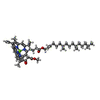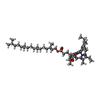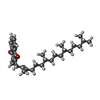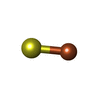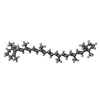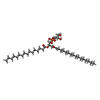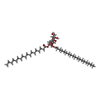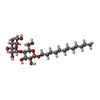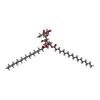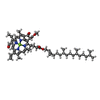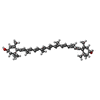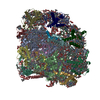[English] 日本語
 Yorodumi
Yorodumi- EMDB-23023: The Structure of the moss PSI-LHCI reveals the evolution of the L... -
+ Open data
Open data
- Basic information
Basic information
| Entry |  | |||||||||
|---|---|---|---|---|---|---|---|---|---|---|
| Title | The Structure of the moss PSI-LHCI reveals the evolution of the LHCI antenna | |||||||||
 Map data Map data | PSI-LHCI from moss | |||||||||
 Sample Sample |
| |||||||||
 Keywords Keywords | PSI / electron transport / photosynthesis / chlorophyll / Antenna / light harvesting / membrane protein | |||||||||
| Function / homology |  Function and homology information Function and homology informationphotosynthesis, light harvesting in photosystem I / photosynthesis, light harvesting / chloroplast thylakoid lumen / photosystem I reaction center / photosystem I / photosynthetic electron transport in photosystem I / photosystem I / photosystem II / chlorophyll binding / chloroplast thylakoid membrane ...photosynthesis, light harvesting in photosystem I / photosynthesis, light harvesting / chloroplast thylakoid lumen / photosystem I reaction center / photosystem I / photosynthetic electron transport in photosystem I / photosystem I / photosystem II / chlorophyll binding / chloroplast thylakoid membrane / response to light stimulus / membrane => GO:0016020 / photosynthesis / chloroplast / 4 iron, 4 sulfur cluster binding / oxidoreductase activity / electron transfer activity / protein domain specific binding / magnesium ion binding / metal ion binding / membrane Similarity search - Function | |||||||||
| Biological species |  Physcomitrium patens (plant) Physcomitrium patens (plant) | |||||||||
| Method | single particle reconstruction / cryo EM / Resolution: 2.8 Å | |||||||||
 Authors Authors | Riddle R / Gorski C | |||||||||
| Funding support | 1 items
| |||||||||
 Citation Citation |  Journal: Nat Plants / Year: 2022 Journal: Nat Plants / Year: 2022Title: The structure of the Physcomitrium patens photosystem I reveals a unique Lhca2 paralogue replacing Lhca4. Authors: C Gorski / R Riddle / H Toporik / Z Da / Z Dobson / D Williams / Y Mazor /  Abstract: The moss Physcomitrium patens diverged from green algae shortly after the colonization of land by ancient plants. This colonization posed new environmental challenges, which drove evolutionary ...The moss Physcomitrium patens diverged from green algae shortly after the colonization of land by ancient plants. This colonization posed new environmental challenges, which drove evolutionary processes. The photosynthetic machinery of modern flowering plants is adapted to the high light conditions on land. Red-shifted Lhca4 antennae are present in the photosystem I light-harvesting complex of many green-lineage plants but absent in P. patens. The cryo-EM structure of the P. patens photosystem I light-harvesting complex I supercomplex (PSI-LHCI) at 2.8 Å reveals that Lhca4 is replaced by a unique Lhca2 paralogue in moss. This PSI-LHCI supercomplex also retains the PsaM subunit, present in Cyanobacteria and several algal species but lost in vascular plants, and the PsaO subunit responsible for binding light-harvesting complex II. The blue-shifted Lhca2 paralogue and chlorophyll b enrichment relative to flowering plants make the P. patens PSI-LHCI spectroscopically unique among other green-lineage supercomplexes. Overall, the structure represents an evolutionary intermediate PSI with the crescent-shaped LHCI common in vascular plants, and contains a unique Lhca2 paralogue that facilitates the moss's adaptation to low-light niches. | |||||||||
| History |
|
- Structure visualization
Structure visualization
| Supplemental images |
|---|
- Downloads & links
Downloads & links
-EMDB archive
| Map data |  emd_23023.map.gz emd_23023.map.gz | 6 MB |  EMDB map data format EMDB map data format | |
|---|---|---|---|---|
| Header (meta data) |  emd-23023-v30.xml emd-23023-v30.xml emd-23023.xml emd-23023.xml | 30.8 KB 30.8 KB | Display Display |  EMDB header EMDB header |
| Images |  emd_23023.png emd_23023.png | 22.6 KB | ||
| Filedesc metadata |  emd-23023.cif.gz emd-23023.cif.gz | 8.3 KB | ||
| Archive directory |  http://ftp.pdbj.org/pub/emdb/structures/EMD-23023 http://ftp.pdbj.org/pub/emdb/structures/EMD-23023 ftp://ftp.pdbj.org/pub/emdb/structures/EMD-23023 ftp://ftp.pdbj.org/pub/emdb/structures/EMD-23023 | HTTPS FTP |
-Related structure data
| Related structure data | 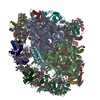 7ksqMC 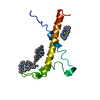 7ku5C 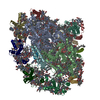 7kuxC M: atomic model generated by this map C: citing same article ( |
|---|---|
| Similar structure data | Similarity search - Function & homology  F&H Search F&H Search |
- Links
Links
| EMDB pages |  EMDB (EBI/PDBe) / EMDB (EBI/PDBe) /  EMDataResource EMDataResource |
|---|---|
| Related items in Molecule of the Month |
- Map
Map
| File |  Download / File: emd_23023.map.gz / Format: CCP4 / Size: 83.7 MB / Type: IMAGE STORED AS FLOATING POINT NUMBER (4 BYTES) Download / File: emd_23023.map.gz / Format: CCP4 / Size: 83.7 MB / Type: IMAGE STORED AS FLOATING POINT NUMBER (4 BYTES) | ||||||||||||||||||||||||||||||||||||
|---|---|---|---|---|---|---|---|---|---|---|---|---|---|---|---|---|---|---|---|---|---|---|---|---|---|---|---|---|---|---|---|---|---|---|---|---|---|
| Annotation | PSI-LHCI from moss | ||||||||||||||||||||||||||||||||||||
| Projections & slices | Image control
Images are generated by Spider. | ||||||||||||||||||||||||||||||||||||
| Voxel size | X=Y=Z: 1.04 Å | ||||||||||||||||||||||||||||||||||||
| Density |
| ||||||||||||||||||||||||||||||||||||
| Symmetry | Space group: 1 | ||||||||||||||||||||||||||||||||||||
| Details | EMDB XML:
|
-Supplemental data
- Sample components
Sample components
+Entire : PSI
+Supramolecule #1: PSI
+Macromolecule #1: Photosystem I P700 chlorophyll a apoprotein A1
+Macromolecule #2: Photosystem I P700 chlorophyll a apoprotein A2
+Macromolecule #3: Chlorophyll a-b binding protein, chloroplastic
+Macromolecule #4: Chlorophyll a-b binding protein, chloroplastic
+Macromolecule #5: Chlorophyll a-b binding protein, chloroplastic
+Macromolecule #6: Chlorophyll a-b binding protein, chloroplastic
+Macromolecule #7: Photosystem I iron-sulfur center
+Macromolecule #8: PsaD
+Macromolecule #9: PsaE
+Macromolecule #10: PSI-F
+Macromolecule #11: PSI-G
+Macromolecule #12: PsaH
+Macromolecule #13: Photosystem I reaction center subunit VIII
+Macromolecule #14: Photosystem I reaction center subunit IX
+Macromolecule #15: PsaK
+Macromolecule #16: PSI subunit V
+Macromolecule #17: Photosystem I reaction center subunit XII
+Macromolecule #18: PsaO
+Macromolecule #19: CHLOROPHYLL A ISOMER
+Macromolecule #20: CHLOROPHYLL A
+Macromolecule #21: PHYLLOQUINONE
+Macromolecule #22: IRON/SULFUR CLUSTER
+Macromolecule #23: BETA-CAROTENE
+Macromolecule #24: 1,2-DIPALMITOYL-PHOSPHATIDYL-GLYCEROLE
+Macromolecule #25: 1,2-DISTEAROYL-MONOGALACTOSYL-DIGLYCERIDE
+Macromolecule #26: DODECYL-BETA-D-MALTOSIDE
+Macromolecule #27: DIGALACTOSYL DIACYL GLYCEROL (DGDG)
+Macromolecule #28: CHLOROPHYLL B
+Macromolecule #29: (3R,3'R,6S)-4,5-DIDEHYDRO-5,6-DIHYDRO-BETA,BETA-CAROTENE-3,3'-DIOL
+Macromolecule #30: water
-Experimental details
-Structure determination
| Method | cryo EM |
|---|---|
 Processing Processing | single particle reconstruction |
| Aggregation state | particle |
- Sample preparation
Sample preparation
| Buffer | pH: 8 |
|---|---|
| Vitrification | Cryogen name: ETHANE |
- Electron microscopy
Electron microscopy
| Microscope | FEI TITAN KRIOS |
|---|---|
| Image recording | Film or detector model: GATAN K2 SUMMIT (4k x 4k) / Average electron dose: 1.6 e/Å2 |
| Electron beam | Acceleration voltage: 300 kV / Electron source:  FIELD EMISSION GUN FIELD EMISSION GUN |
| Electron optics | Illumination mode: FLOOD BEAM / Imaging mode: BRIGHT FIELD |
| Experimental equipment |  Model: Titan Krios / Image courtesy: FEI Company |
- Image processing
Image processing
| Startup model | Type of model: PDB ENTRY PDB model - PDB ID: |
|---|---|
| Final reconstruction | Resolution.type: BY AUTHOR / Resolution: 2.8 Å / Resolution method: FSC 0.143 CUT-OFF / Number images used: 114608 |
| Initial angle assignment | Type: MAXIMUM LIKELIHOOD |
| Final angle assignment | Type: MAXIMUM LIKELIHOOD / Software - Name: RELION (ver. 3.1) |
 Movie
Movie Controller
Controller


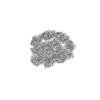


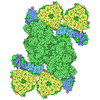


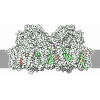
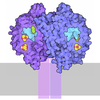

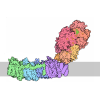
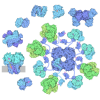

 Z (Sec.)
Z (Sec.) Y (Row.)
Y (Row.) X (Col.)
X (Col.)




















